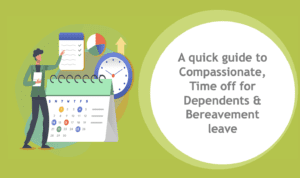A quick guide to Compassionate, Time off for Dependents & Bereavement leave
There is often confusion around compassionate, bereavement and time off for dependants. This guide should help you understand the differences.
Compassionate leave
Compassionate leave helps you cope with the death of a close relative or friend and deal with all the necessary arrangements and attend their funeral. It may also be granted in the case of a relative being seriously or critically ill.
As it stands, an organisation doesn’t actually have any legal obligation to offer their staff compassionate leave in the UK, although most organisations will offer 3-5 days paid or unpaid leave. Always read your contract and company handbook for this information as many organisations vary.
Compassionate leave may need to be taken at short notice, without your employer having time to prepare for the loss in staffing, and maybe without a set end point for their return to work.
Time off for dependants
A dependant is a spouse, partner or civil partner, child, grandchild, parent, or someone who depends on you for care.
Employees including part time employees can take time off to care for dependents. It may be that you have to: –
- Deal with a breakdown in childcare.
- Plan longer term care for children or elderly relatives.
- Deal with issues relating to a dependant falling ill, been assaulted, injured or been taken into hospital.
- A depended has died.
- Arrange or attending a funeral.
- A dependant gives birth.
- Employees child has been involved in a school incident
More information https://www.gov.uk/time-off-for-dependants
Employees have a duty to:
- notify the employer of their absence and the reason for it as soon as is reasonably practicable
- inform the employer of how long they expect to be off work.
The law recognises that there may be occasions when you need to take time off work to deal with unexpected events involving one of your dependants.
Employees are entitled to reasonable time off, but each case will need to be judged on its specific circumstance.
There is no statutory obligation on employers to pay employees for the time they take off to care for dependants.
Bereavements leave
Introduced on 6th April 2020
Bereavement time off is usually given for the death of immediate family members but can extend to relatives and even friends depending on the employer’s policy and your responsibilities.
To check if you are eligible go to; –
https://www.gov.uk/employers-parental-bereavement-pay-leave/eligibility
Refers to taking time off work following
- Death of a dependant
- Death of a child under 18 years old
- Still birth after 24 weeks
You have the legal right to two weeks of bereavement leave.
This can be taken any time within 56 weeks of death, and you don’t need to give your employer any notice in advance. You also have the option of taking your bereavement leave as two weeks in a row or two separate weeks.
From 2nd April 2023, the flat weekly rate of statutory maternity, paternity, adoption, shared parental and parental bereavement pay will increase from £156.66 to £172.48. From 6 April 2023 the rate of statutory sick pay increases from £99.35 to £109.40 per week.
More information https://www.gov.uk/parental-bereavement-pay-leave


